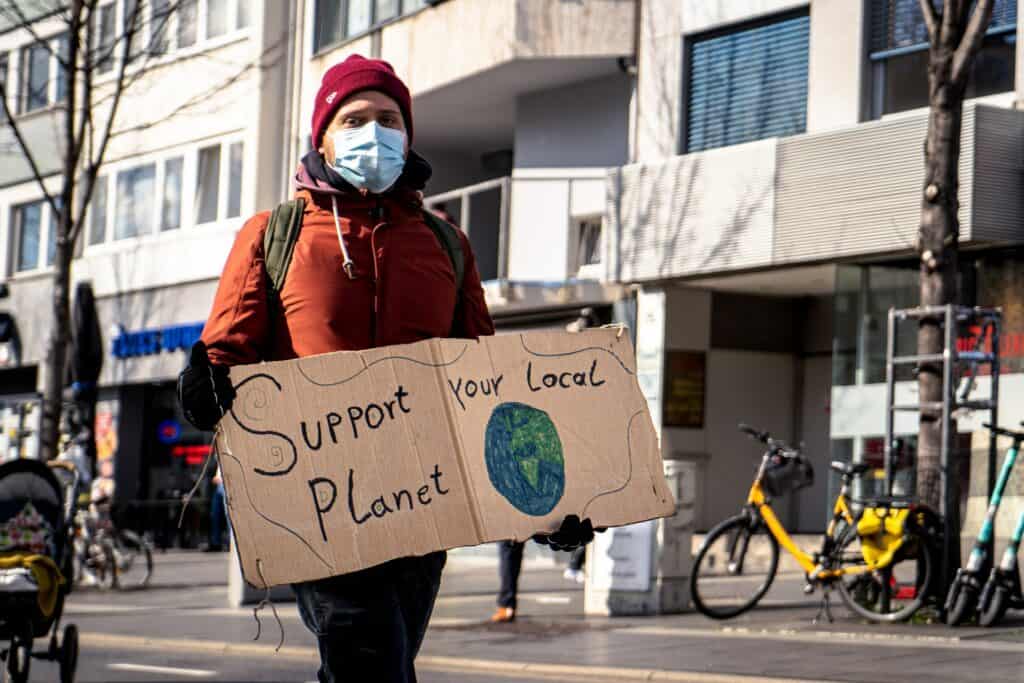What Exactly Is Meant By “Ecofriendly”?
Eco-friendly – it’s a common enough word that gets thrown around, but what does it mean? The reason you’re probably looking this up is because you’re confronted with the need to make a decision, which could be about buying a product, or undertaking an activity for your lifestyle, or choosing what to eat. Most people would probably say that anything that helps the environment is eco-friendly. This definition is technically correct, but it doesn’t give us a clear understanding of what eco-friendly means.
The Greek word “Oikos,” meaning “home,” is the origin of the prefix “eco” in the term “eco-friendly.” This word is fitting because when we talk about being eco-friendly, we’re talking about taking care of our planet – our home. And just like we need to take care of our houses, we need to take care of our planet.

Many individuals assume it’s hard or costly to adapt to an ecofriendly lifestyle. In this piece, we’ll propose 5 definitions of ecofriendly and debunk several fallacies. We’ll also cover simple methods to go green today.
To do this, we need to be conscious of the things we’re doing that could be harming the environment. This might mean recycling instead of throwing things away, using less water or energy or driving less. Anything we can do to reduce our impact on the planet is to be eco-friendly and preserve harmless environmental activity.
Most Common Definitions Of Being Eco Friendly
1. Saves The Environment
This is largely a values-based definition – if the “environment” is important to you then you would consider eco-friendliness to equate with preserving or promoting the “environment”. By environment, we mean the state of nature of the natural world outside of our immediate urban living spaces. Therefore, there are people who are uninterested in saving the environment because it has no immediate impact on their lives. This is because most people live in urban areas, cities, suburbs, or even rural areas that are serviced by infrastructure. There are few people who live truly in the wild as inside a rainforest or desert or in wilderness. As such, 99% of us are completely unaffected by whether trees are being cut down or there’s pollution in the seas. By being environment friendly, in theory we protect and save the environment from pollution and other forms of damage.
2. Reduces Your Carbon Footprint
Reducing your carbon footprint means lessening your contribution to carbon dioxide emissions. This can be done in a way that has little impact on the environment. For example toxic chemicals could being released into rivers, water is overused, landfills increase as a result of more waste. Carbon reduction is a rather singularly focused way to think about the word “eco-friendly”. One way of reducing your carbon footprint is by switching to green energy sources like solar or wind power. Another way is by ensuring that energy-efficient appliances are used in your home or office. The reason for this singular focus is that carbon is the main driver of planetary warming, which as far as we can tell, has wide-ranging effects that are very hard for us to confront by simple adaption.
3. Helps Conserve Natural Resources
Conserving natural resources simply put means using them wisely and not wasting them. Some ways of conserving natural resources include recycling, using public transportation, using energy-efficient appliances, etc. When we conserve natural resources, we help reduce pollution and protect the environment.
4. Helps Preserve Wildlife
As with saving the environment, preserving wild life is a values-based reason for being “eco-friendly”. A lot of animals are now on the verge of extinction due to loss of habitat and hunting. You can help preserve wildlife by supporting organizations that work towards this cause or by donating to them. You can also do your bit by planting trees which will help in increasing the green cover and thus provide a habitat for animals.

5. Makes You Healthy And Fit
Believe it or not, being environment friendly also has a lot of health benefits! This is because when you switch to green practices, you automatically start living a healthier lifestyle. For instance, if you start cycling to work instead of taking the car, you end up getting some exercise which is great for your health! Similarly, when you use public transportation, you walk more which again is good for your health. This is perhaps a somewhat tangled reason that joins two different benefits but we don’t see why it’s not a great reason just because its more complicated. In fact, you can think of this as a life style change which has dual impact: one external and one internal.
What Are Ecofriendly Fallacies?
There’s a lot of pressure to be eco-friendly these days. We’re told to recycle, compost, reduce our energy consumption, drive less, eat organic… the list goes on. And while all of these things are important, sometimes the message gets lost in translation. As a result, a lot of people have adopted some fallacious beliefs about eco-friendliness. Here are three of the most common ecofriendly fallacies:
1. Going Green Is Expensive.
Some eco-friendly choices can indeed be pricey upfront. For example, investing in energy-efficient appliances may cost more initially, but you’ll see savings on your utility bills over time. Similarly, purchasing a reusable water bottle or reusable shopping bag may cost a few dollars, but it will save you money in the long run by eliminating the need to buy disposable products.
2. You Have To Go Completely Green To Make A Difference.
This simply isn’t true! Every little bit counts when it comes to saving the planet. Making just one small change in your daily routine can have a big impact over time. So don’t feel like you have to completely overhaul your lifestyle to make a difference. Just start with one small change and build from there.
3. Going Green Is Inconvenient.
Again, this isn’t always true. Sure, some eco-friendly choices may require a bit more effort than others. But oftentimes, these choices are more convenient in the long run. For example, taking public transportation instead of driving saves you time and money (not to mention reduces your carbon footprint). And cooking at home rather than eating out tends to be healthier and cheaper (plus it generates less waste). So next time you’re feeling overwhelmed by the pressure to go green, remember that every little bit counts… and that going green doesn’t have to be difficult or inconvenient!
What Are Ecofriendly Products?
Ecofriendly products are those that do not damage the environment. This can mean different things for different products, but in general, ecofriendly products are made from sustainable materials and are designed to be reused or recycled. For example, an ecofriendly water bottle might be made from glass or stainless steel, rather than plastic. Or, an ecofriendly shirt might be made from organic cotton or bamboo.
In addition to being good for the planet, ecofriendly products often have other benefits as well. For example, they can be healthier for you and your family, since they don’t contain harmful chemicals. And, they can save you money since they’re designed to last longer than conventional products. Whether you’re looking for ways to be more environmentally friendly or simply want to purchase quality items that will stand the test of time, ecofriendly products are a great option.
3 Examples Of Ecofriendly Products And Actions
In the beginning you will struggle to identify what in your life benefits from the eco-friendly mindset. It will take time to go through all the things that you do or use that will have an alternative solution with less impact on the planet. We list here a few to get you started:
1. Activities That Have Eco-Friendly Impact
Eco-friendly activities are activities that help to reduce harm to the environment. Examples of eco-friendly activities include: recycling, composting, reducing energy consumption, supporting local businesses, using public transportation or carpooling, avoiding single-use plastics, shopping secondhand, and planting trees.
2. Zero-Waste Bathroom Care
Mundane items like eco-friendly shave bar soap, toothpaste, and mouthwash can become a part of your life that have incremental positive impact. The cost is that you need to do research which is why we’ve put together these resources for you.
3. Eco-Friendly Kitchen And Laundry
Things that do around the house for living upkeep like laundry and kitchen work can be made eco-friendly. You don’t even need to buy these things. You can also make your own cleaners and detergents.
Conclusion
Being ecofriendly or environment-friendly is becoming more and more important. You can see the change yourself; in the last ten years, there are more and more electric cars on the roads, people are using public transportation more, and there are more and more products that are made to be ecofriendly.
All of these changes are happening because people are becoming more aware of the damage that human beings are doing to the environment. And it’s not just about climate change; it’s about the air we breathe, the water we drink, and the food we eat. The bottom line is that we need to be kinder to our planet if we want to continue living on it.
